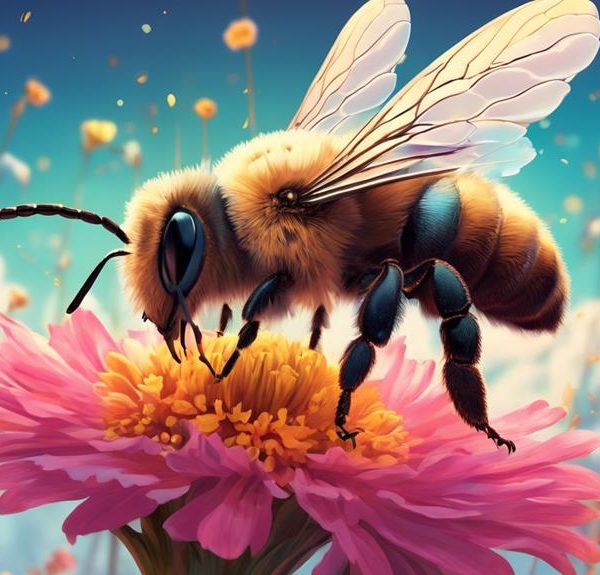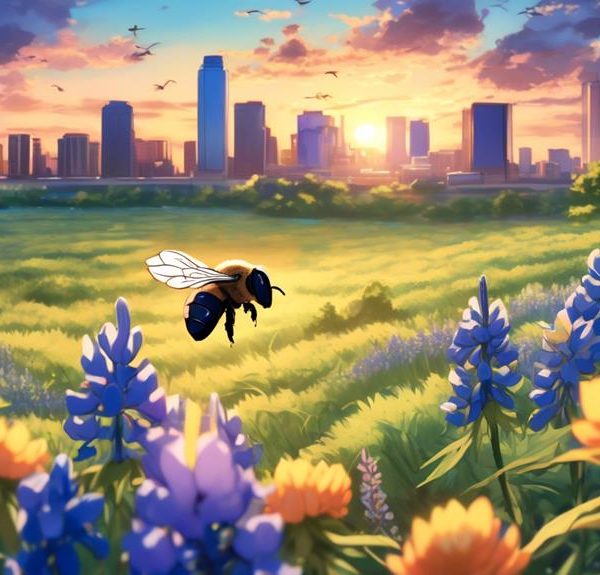Find out the intriguing truth about the presence of Mason Bees in California's diverse ecosystems.
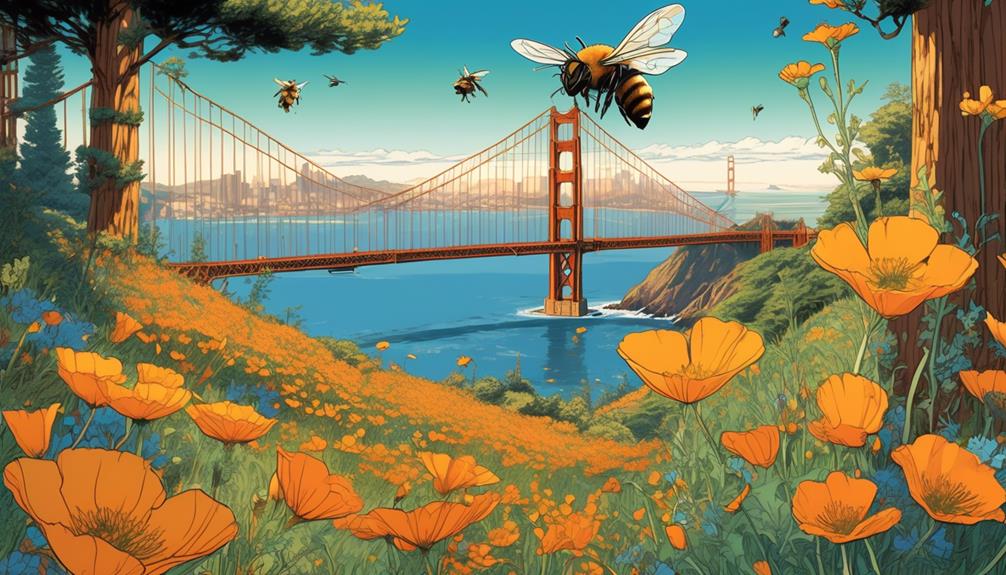
Are Mason Bees Found in California
Bursting with biodiversity, California's captivating countryside is a haven for a host of different species. You might have heard about Mason Bees, those small, solitary insects that are incredible pollinators.
But, have you ever wondered if these buzzing creatures are found in California? Well, it's not as straightforward as you might think. There's a certain complexity surrounding this question that invites further exploration.
So, let's dive into the world of Mason Bees and uncover the intricacies of their presence, or absence, in the Golden State.
Key Takeaways
- Mason bees are solitary creatures that do not live in hives but nest in holes in wood or hollow stems.
- Mason bees are more efficient pollinators than honeybees as they carry pollen on their undersides, increasing pollination.
- Mason bees play a vital role in maintaining biodiversity and promoting a healthy environment and sustainable ecosystem in California.
- Mason bees are crucial for fruit and nut orchards in California, contributing to increased productivity and survival of plants.
Understanding Mason Bees
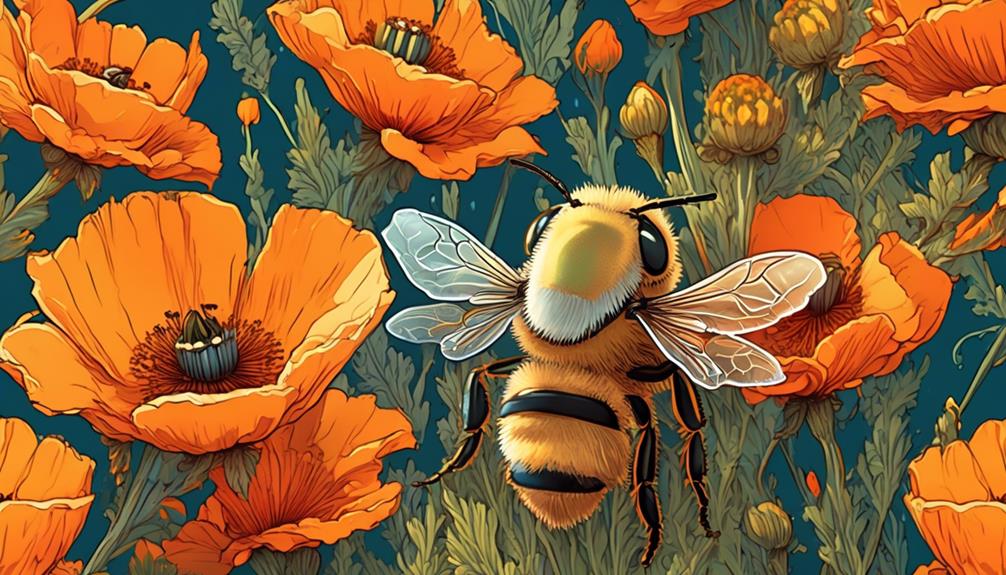
To fully appreciate the role of mason bees in California's ecosystem, it's crucial to understand their unique characteristics and behaviors. Unlike honeybees, mason bees are solitary creatures. Each female is a queen, laying eggs in individual cells and providing each with a food supply. They don't live in hives, nor do they produce honey. Instead, you'll often find them nesting in holes in wood or hollow stems.
Also, mason bees are more efficient pollinators than honeybees. They carry pollen on their undersides, rather than in special sacks on their legs, causing more of it to rub off as they flit from flower to flower. This is a boon for California's fruit and nut orchards.
They're non-aggressive too. Male mason bees don't have stingers, and females only sting if trapped or squeezed. So, you don't have to worry about them causing harm.
Lastly, mason bees are native to North America, including California. They're adapted to local climates and plants, making them important players in the state's biodiversity. Understanding these factors is key to appreciating their role.
Mason Bees: An Overview
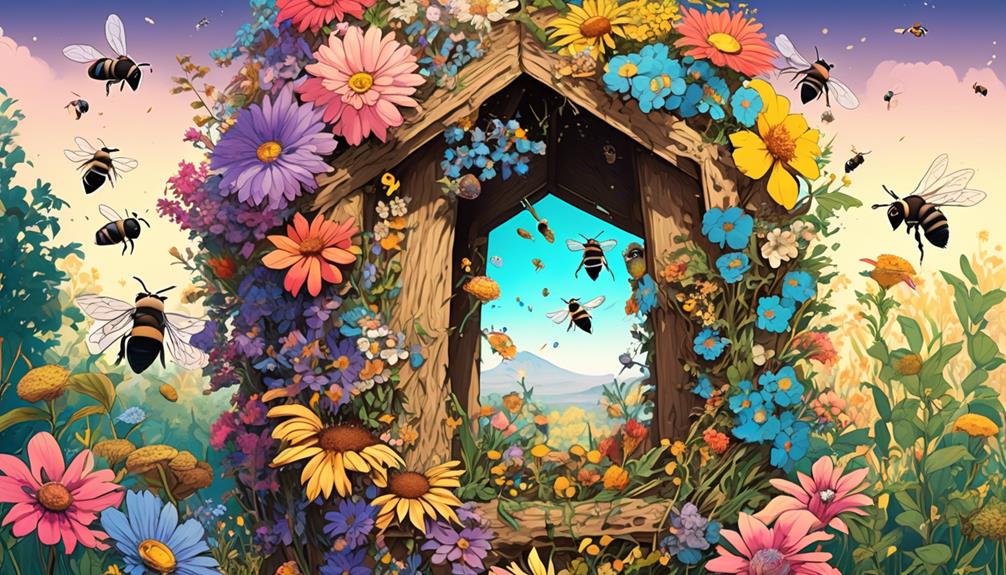
Understanding mason bees isn't just about their behaviors and traits; it's also about recognizing their significance in the ecosystem. They're a group of bees known for their solitary nature and unique nesting habits. Unlike honey bees that live in colonies, mason bees operate independently. They're named 'mason' due to their habit of using mud or other masonry products to construct their nests.
Mason bees, you'll find, aren't as aggressive as other bee species. They only sting when they're threatened, making them a safe neighbor in your backyard. They're typically metallic blue or green in color, adding a touch of beauty to your garden.
But mason bees aren't just pretty to look at. They're also vital pollinators, making them crucial to the survival of our ecosystems. They're more efficient at pollination than honey bees, thus playing a significant role in maintaining biodiversity. This means that when you're promoting a healthy environment for mason bees, you're also contributing to a more sustainable and productive ecosystem.
Mason Bees in the United States
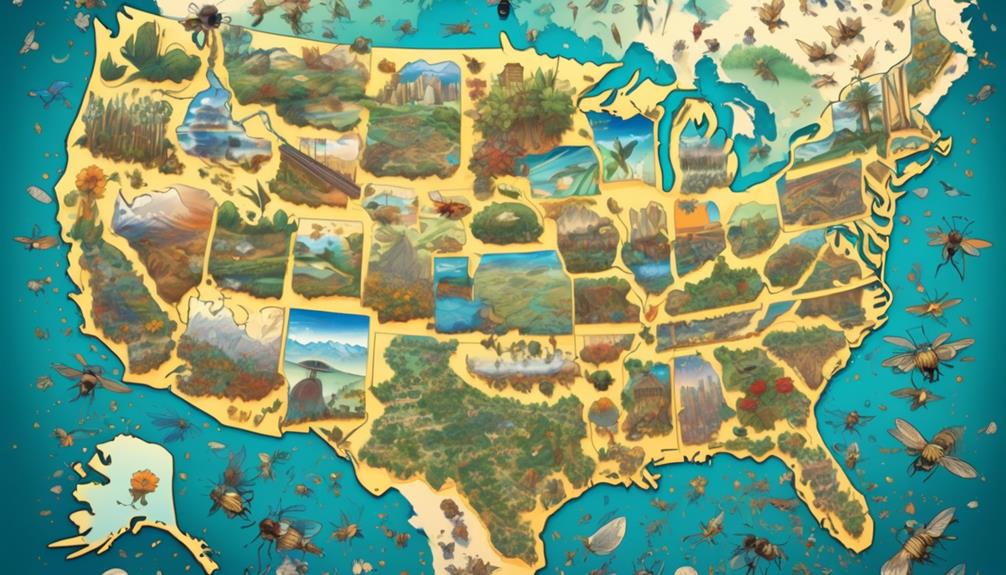
While their role in maintaining biodiversity is globally recognized, it's within the United States, and particularly in California, that mason bees' ecological significance truly shines. You'll find these industrious insects working tirelessly across the country, from the apple orchards of New York to the almond groves of California.
Mason bees are solitary creatures, unlike their honeybee counterparts, and they're excellent pollinators, making them a vital asset to any garden or farm. They're especially crucial in the US, where the population of honeybees has been declining. In fact, it's been found that a single mason bee can do the work of 100 honeybees.
In California, you'll see mason bees buzzing about in the early spring. They're attracted to a range of plants, including fruit trees, wildflowers, and vegetables. They're so beneficial that many Californians are encouraging their presence by setting up mason bee houses in their gardens.
California's Bee Population
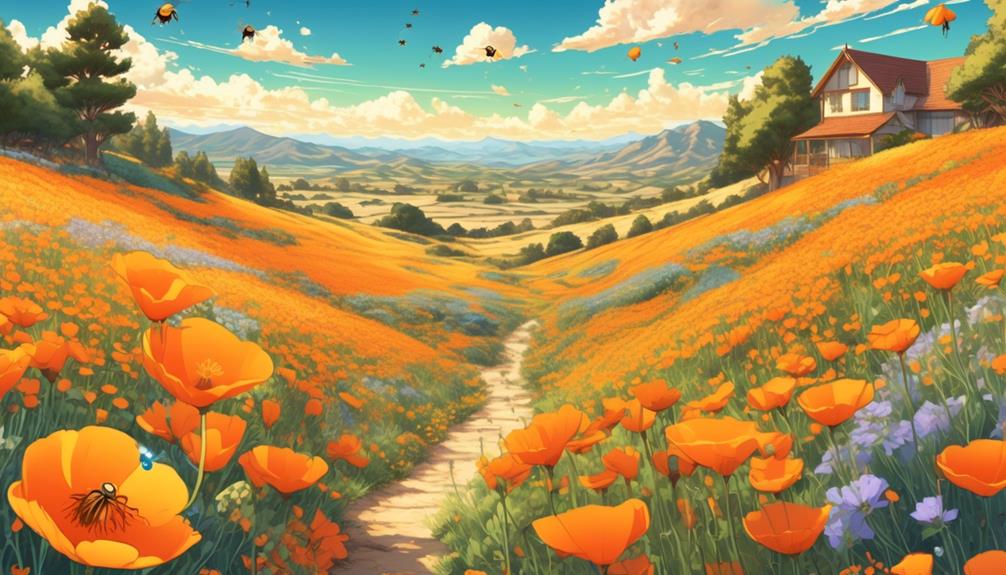
Despite the daunting decline in honeybee numbers, California's bee population is seeing a remarkable boost, largely thanks to the diligent work of mason bees. You might be intrigued to learn that these small, unsung heroes play a pivotal role in maintaining the state's rich biodiversity. They're specialist pollinators, transferring pollen at a rate substantially higher than the average honeybee, which significantly enhances the productivity and survival of local flora.
Next time you're savoring an almond snack or a juicy apple, remember it's largely the mason bees you have to thank. These bees are critical for California's billion-dollar almond industry, as they're more effective pollinators under cooler conditions, typical of almond flowering season.
However, the mason bee population isn't without its challenges. Habitat loss and pesticide exposure remain key threats. But you can help! By planting native flowers, reducing pesticide use, and providing nesting sites, you can contribute to their survival.
Mason Bees' Presence in California
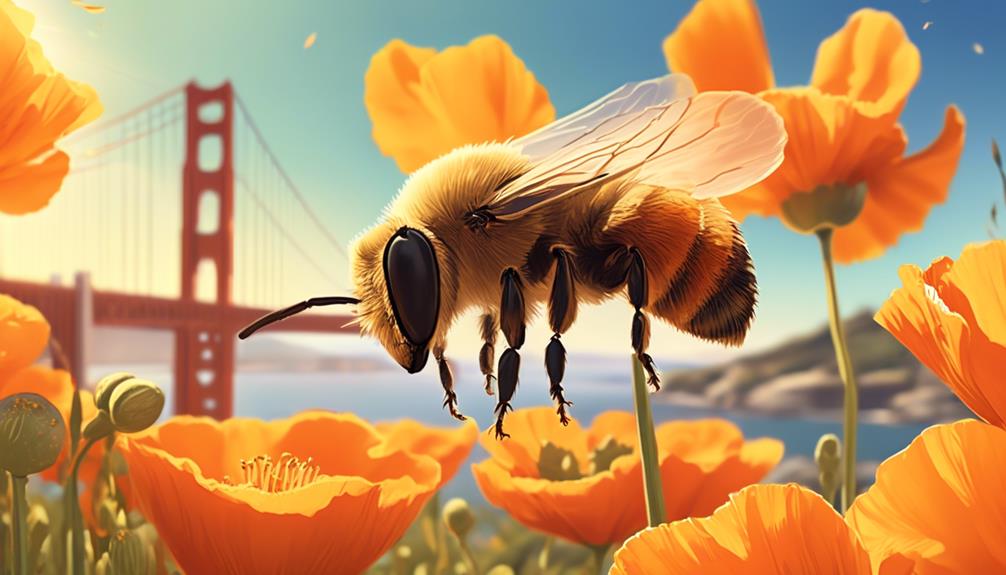
Often overlooked, mason bees are a common sight in California, buzzing about with tireless dedication to pollination. You might be surprised to find out that they're among the most efficient pollinators in the bee family. They're solitary, non-aggressive creatures and you'll often spot them in your gardens or orchards, contributing significantly to plant propagation.
While you may associate honeybees with pollination, mason bees can actually do this job up to 100 times more efficiently. They're drawn to a wide array of flowering plants, so they're likely to visit your garden if you've got a variety of blooms. Unlike honeybees, they don't produce honey or beeswax but build their nests using mud, hence their name.
Despite being less known than their honeybee counterparts, mason bees play an essential role in California's ecosystem. They're crucial for maintaining the biodiversity of plants. However, their populations are threatened due to habitat loss and pesticide exposure. It's important to take steps to protect these industrious insects. You can do this by avoiding harmful pesticides, providing a variety of flowering plants, and setting up bee houses for them to nest in.
Benefits of California Mason Bees
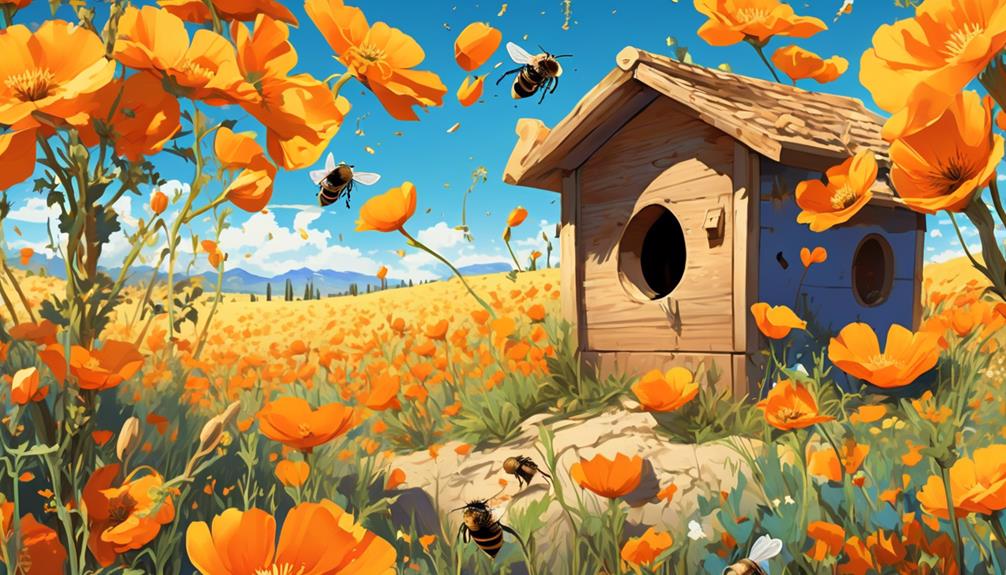
Understanding the importance of mason bees' role in pollination, you might be wondering about the specific benefits these industrious insects bring to California's ecosystem. In fact, the impact of these tiny powerhouses isn't just limited to the Golden State; it's felt globally.
Mason bees, unlike honey bees, are solitary creatures and don't produce honey. Yet, they're much more efficient at pollinating plants. This is because they carry pollen on their abdomen, which comes into direct contact with each flower. As a result, they help to increase the yield and quality of fruits and vegetables in California's agricultural fields.
Moreover, these bees are a boon for home gardeners too. They're non-aggressive and rarely sting, which makes them a safe choice for urban settings. They can significantly improve the productivity of your garden, ensuring you have a bumper crop of flowers, fruits, and veggies.
In addition, mason bees also play a crucial role in maintaining California's diverse flora. By pollinating native plants, they aid in the preservation of the state's ecological balance. So next time you spot a mason bee, don't forget to appreciate the hard work it puts in to keeping our world green and blooming.
Frequently Asked Questions
What Specific Plants Do Mason Bees Pollinate in California?
You're curious about which specific plants mason bees pollinate in California. Well, they're quite versatile! They pollinate a vast range of plants, including fruit trees like cherries, plums, and peaches. They're also great at pollinating berries, vegetables, and wildflowers.
Are There Any Known Predators of Mason Bees in California?
Yes, Mason bees in California do have predators. Birds, spiders, and insect-eating mammals often prey on them. Additionally, parasitic insects can pose a threat. They'll lay their eggs inside the bee's nest, and when the larvae hatch, they consume the bee's food and sometimes the bee larvae.
It's a tough world out there, but don't worry, Mason bees are resilient and still manage to thrive despite these challenges.
How Can You Create a Suitable Habitat for Mason Bees in Your California Garden?
To create a suitable habitat for Mason bees in your California garden, you'll need to provide nesting materials. They love tunnels, so consider bamboo tubes or drilled blocks of untreated wood.
Also, ensure they have a mud source for sealing their nests.
Plant native, pollen-rich flowers to feed them.
Remember, they need sun exposure, so place your bee homes in a sunny spot.
Do Mason Bees in California Carry Any Diseases That Could Affect Other Bee Species or Humans?
Yes, Mason bees in California do carry diseases but they're not harmful to humans. They can, however, affect other bee species.
You should keep an eye out for chalkbrood and mites, which could affect your Mason bees and potentially spread to others. It's crucial to maintain clean and healthy habitats to prevent these issues.
Always monitor your bees for any signs of disease or pests.
What Are the Legal Implications of Breeding and Selling Mason Bees in California?
You're curious about the legal implications of breeding and selling Mason bees in California. As of now, there aren't specific laws regulating this.
However, you'd still need to follow general business regulations. It's important to ensure that your bees are disease-free, not causing harm to local ecosystems.
Consult a local agricultural extension or legal advisor for precise information.
Always remember, responsible beekeeping benefits everyone, including our environment.
Conclusion
So, you see, mason bees do indeed buzz around California. They're an essential part of the state's ecosystem, pollinating plants and supporting biodiversity.
They're a boon to California's agricultural sector too. So next time you spot a mason bee, appreciate its vital role in maintaining the health of California's environment.
It's a small creature with a significant impact.

